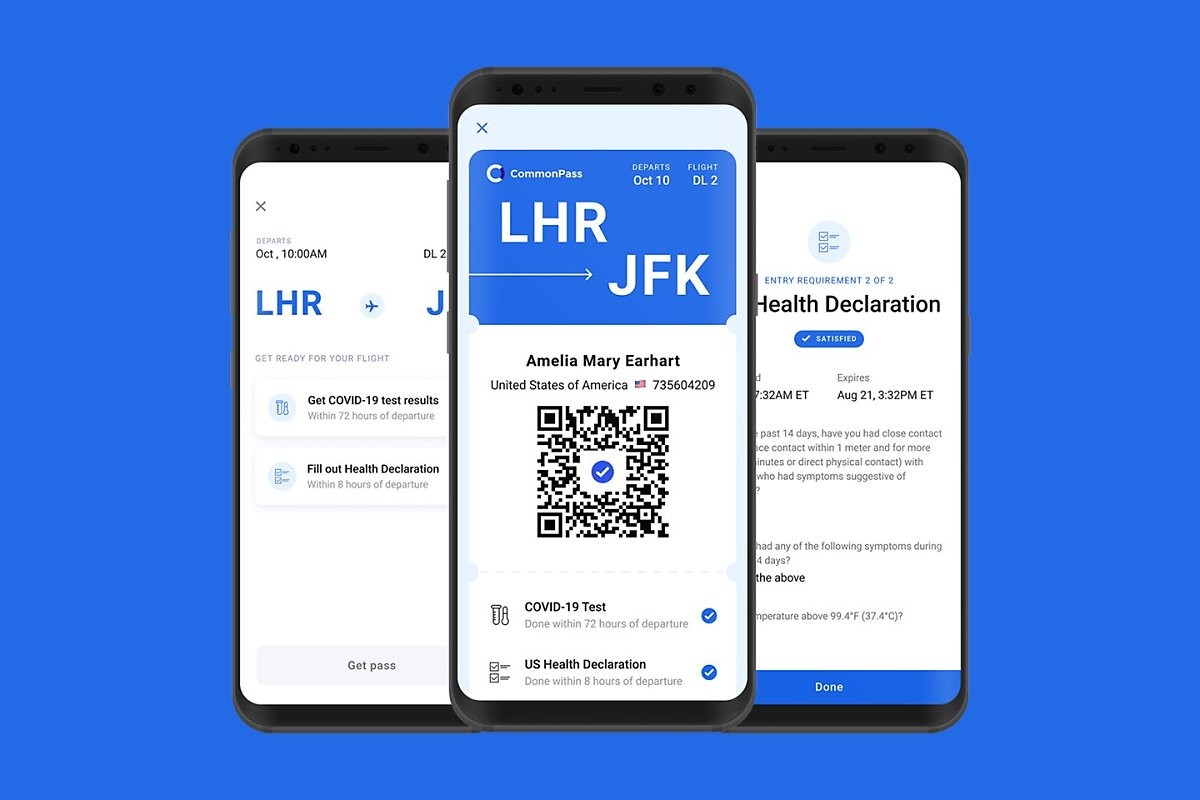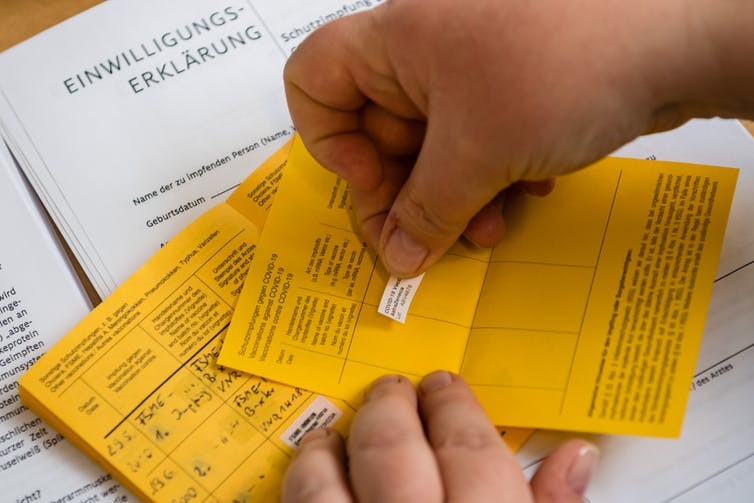With the launch of the global COVID-19 vaccine inoculation program, countries around the world are promoting the introduction of electronic vaccine certificates. The Commissioner of the EU said that to save the travel industry, hit hard by COVID-19, it will submit a bill to create a 'Digital Green Certificate' before the summer vacation season. This certificate will be issued to people who have the necessary antibodies after receiving a COVID-19 vaccination or tested negative for the virus. Holders of the digital certificate or “vaccine passport” would be granted free entry when traveling between countries and ease of access at local restaurants and hotels in participating countries.
 |
| ▲ Common pass which provides information about vaccination. (Photo from Common Pass) |
The certificate would be stored on a smartphone or issued in paper form if necessary, with all the pertinent information stored in a QR code. Following Iceland, which began issuing vaccination certificates for the first time in the world on January 26 of this year, governments such as China, Israel, the European Union (EU), and air travel-related organizations such as the International Air Transport Association (IATA) are establishing a similar certificate issuance system. While these governments and agencies are moving forward with their plans, concerns about the side effects of a vaccine passport such as deepening inequality, personal information infringement, and limited effectiveness, are also on the rise.Public opinion is split over the institutionalization of vaccine passports. The tourism industry is a key proponent of the pro-passport side. According to UNWTO, due to the pandemic, export revenues from the tourism fell by an estimated $910 billion to $1.2 trillion in 2020. This has had a wider impact and could reduce global GDP by 1.5% to 2.8%. To address this problem, the tourism industry is throwing its support behind the institutionalization of vaccine passports, believing it will be a route back to unrestricted travel. The International Air Transport Association (IATA), the trade association for the world’s airlines, is working on launching a mobile application called the ‘IATA Travel Pass’ that will be available in iOS and Android stores sometime in the first half of 2021. In addition to the information about whether one is vaccinated or not, the application will also show the location and date of the vaccination. For those not yet vaccinated, the app will show whether they had a polymerase chain reaction test, a test performed to detect the presence of a covid-19 virus, and other related test results to increase the reliability of the information.
The IATA explained that the application will help collect and organize necessary travel health data, so that entry and departure procedures can be easily carried out. It would also provide standardized reliable information related to the travelers’ physical condition ensuring the safety of all parties in the process. The IATA Travel Pass will be on trial with more than 20 airlines including Singapore Airlines, Emirates, Etihad, Air New Zealand when it is launched. Meanwhile, many tourism-dependent countries including Spain, Greece, Thailand, Vietnam and are also throwing their support behind the vaccine passport. In the case of Thailand, the world’s largest tourist destination, foreign tourist spending accounted for 11% of its gross domestic product in 2019. However, the Krung Thai Bank, estimated the nation saw a 70% decrease in tourism income in 2020 as compared to the previous year. These countries, struggling with a downturn in the travel market, are hoping for the recovery of the travel market in the summer season with the introduction of vaccine passports.
Not everyone is on-board with the vaccine passports. The World Health Organization (WHO) believes that national authorities and conveyance operators should not introduce requirements of proof of COVID-19 vaccine passport for international travel as a condition for departure or entry. They are concerned that more infectious COVID variants are spreading all over the world and there are still critical unknowns regarding the efficacy of vaccines in reducing transmission. The WHO also believes that people who are vaccinated should not be exempt from complying with other travel risk-reduction measures.
The WHO expressed concerns that the inequitable distribution of COVID-19 vaccines could deepen the already existing inequalities between people and nations and introduce new ones. A system of “preferential vaccination for travelers” could lead to a shortage of shots for people who need them most, such as those in vulnerable communities, as the supply of COVID-19 vaccines is still limited. They also pointed out that because a large percentage of the supply is going toward people or countries of higher socioeconomic status, the vaccine passport system would be titled in their favor.
The WHO is not the only organization weary of a reliance on a travel passport plan. Cyber security experts are raising red flags about the privacy of users. The first digital vaccine passports for post-pandemic travel have been designed as easy-to-use applications. However, the vaccine passports display more information than simply whether the individual has been vaccinated and uses outdated encryption technology that is potentially vulnerable to security breaches and hackers. To be effective, this system would need to meet several key criteria that ensure user information is safely stored and shared.
 |
| ▲ International certificate of Vaccination or Prophylaxis. (Photo from The Conversation) |
Despite these concerns, many countries including Thailand, the United Kingdom (UK), China, and Spain are getting ready to adopt a vaccine passport program. Spain is planning to launch their program to help the travel industry recover in May while the UK is planning to introduce a domestic vaccine passport that will grant users easy access to pubs and theaters. The Common Trust Network, launched by the World Economic Forum is also developing a vaccination certificate named ‘Common Pass’ and a group of technology and health companies including Microsoft, Salesforce and Oracle have formed a coalition known as Vaccination Credential Initiative to develop a secure vaccine passport.Though it seems to be the best solution for re-opening of our restricted world, we should never discount the concerns about a lack of information about the virus mutations and vaccine efficacy as well as the issues of inequality and information security. For this to be effective, all concerns should be mitigated in advance. This is one program we need to get right. Our very future and well being is a stake.
정예지, 권유지, 김서연 dankookherald@gmail.com

![[Campus Magnifier] Let's Surf the Library!](/news/photo/202404/12496_1765_4143.jpg) [Campus Magnifier] Let's Surf the Library!
[Campus Magnifier] Let's Surf the Library!
![[Campus Magnifier] Let's Surf the Library!](/news/thumbnail/202404/12496_1765_4143_v150.jpg)





